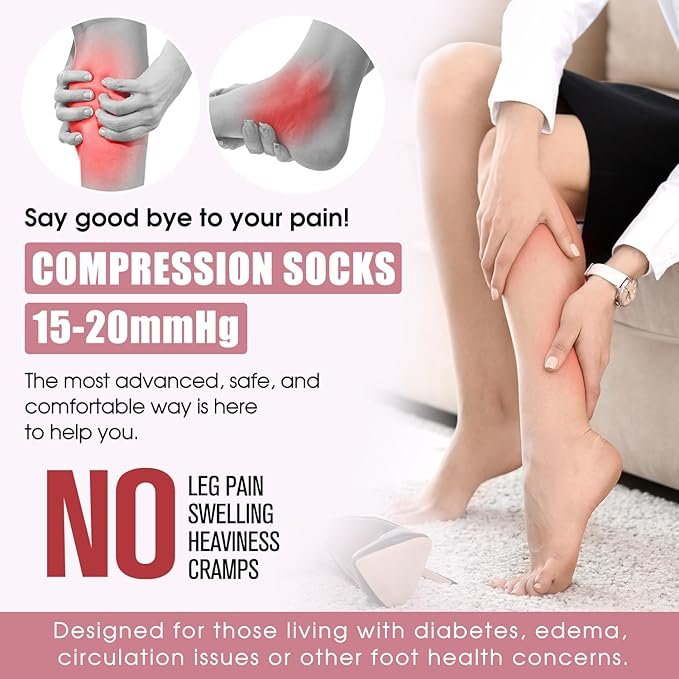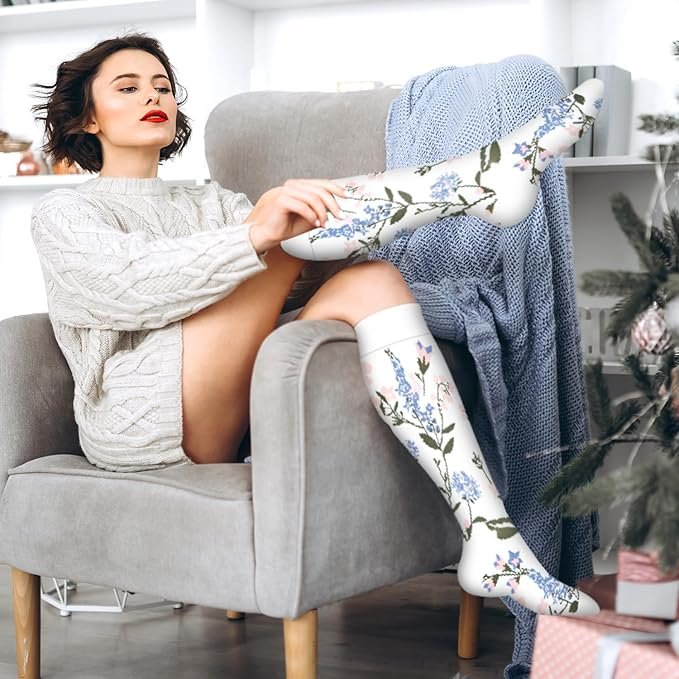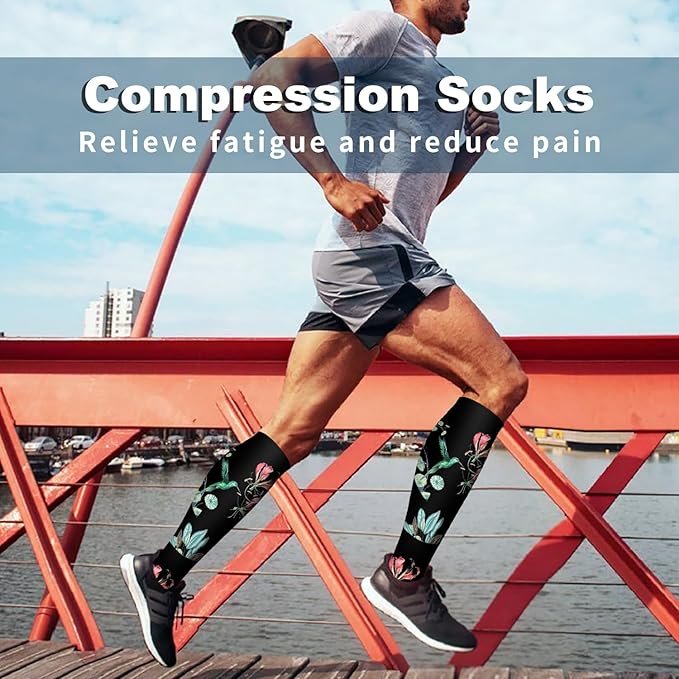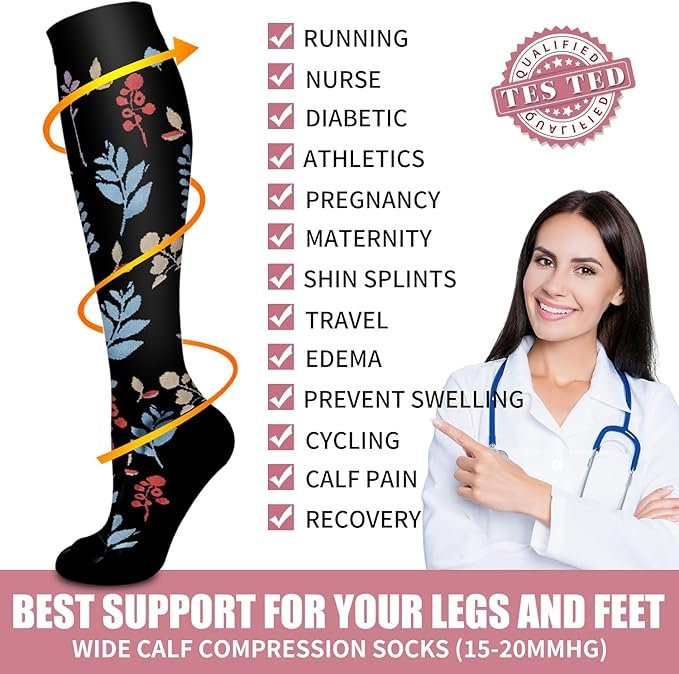Compression Socks for Women
Compression Socks for Women: A Comprehensive Guide to Comfort and Health
Compression socks for women have become a popular and essential accessory for women of all ages and lifestyles. Whether you’re an athlete, a frequent traveler, a busy professional, or someone who spends long hours on your feet, compression socks offer a range of benefits that go beyond mere fashion. These specially designed socks apply gentle pressure to your legs, promoting better blood circulation, reducing swelling, and preventing various health issues. This article aims to inform and educate women about the benefits, types, and uses of compression socks, helping you make an informed decision about incorporating them into your daily routine.

What Are Compression Socks?
Compression Socks for Women are specialized hosiery designed to apply pressure to your lower legs, helping to maintain blood flow, reduce discomfort, and prevent swelling. They are typically made from a blend of elastic materials like nylon, spandex, or rubber, which provide the necessary compression. The pressure is highest at the ankle and gradually decreases as it moves up the leg, encouraging blood to flow back towards the heart.
Table of Contents
Benefits of Compression Socks for Women

Bluemaple Copper Compression Socks For Women & Men Circulation – Best for Running, Nursing,Hiking,Flight&Travel
1. Improved Blood Circulation
One of the primary benefits of compression socks is their ability to enhance blood circulation. Poor circulation can lead to various health issues, including varicose veins, deep vein thrombosis (DVT), and swelling. Compression socks help by promoting venous return, which is the flow of blood back to the heart. This is particularly beneficial for women who spend long hours sitting or standing.

2. Reduced Swelling and Edema
Swelling, or edema, is a common issue, especially during pregnancy or long flights. Compression socks can help reduce this swelling by preventing fluid from accumulating in the lower legs. This is particularly useful for pregnant women, who often experience swollen feet and ankles due to increased blood volume and pressure on the veins.

3. Prevention of Varicose Veins
Varicose veins are swollen, twisted veins that are visible just under the surface of the skin. They are more common in women and can be both painful and unsightly. Compression socks can help prevent varicose veins by improving blood flow and reducing the pressure on the veins.
4. Enhanced Athletic Performance and Recovery

Athletes, both amateur and professional, can benefit from compression socks. They help improve oxygen delivery to the muscles, reduce muscle fatigue, and speed up recovery after intense workouts. Many female athletes use compression socks during training and competitions to enhance performance and reduce the risk of injury.

5. Comfort During Travel
Long flights or car rides can be uncomfortable and increase the risk of developing blood clots, a condition known as deep vein thrombosis (DVT). Compression socks are highly recommended for frequent travelers as they help maintain proper blood circulation and reduce the risk of DVT.
6. Support During Pregnancy
Pregnancy can put a lot of strain on a woman’s body, particularly on the legs and feet. Compression socks can provide much-needed support, reduce swelling, and alleviate the discomfort associated with pregnancy. They are especially beneficial during the later stages of pregnancy when the risk of varicose veins and swelling increases.
Types of Compression Socks for Women
1. Graduated Compression Socks
These are the most common type of compression socks, designed to provide the highest level of compression at the ankle, gradually decreasing as it moves up the leg. They are ideal for everyday use, travel, and medical conditions like varicose veins and DVT.
2. Anti-Embolism Compression Socks
These socks are specifically designed for individuals who are bedridden or have limited mobility. They help prevent blood clots and are often used in hospitals for patients recovering from surgery.
3. Non-Medical Support Hosiery
These are lighter compression socks designed for general use. They provide mild compression and are suitable for people who experience minor swelling or discomfort but do not have any serious medical conditions.
4. Athletic Compression Socks
Designed for athletes, these socks offer targeted compression to specific muscle groups, enhancing performance and speeding up recovery. They are often made from moisture-wicking materials to keep the feet dry and comfortable during intense workouts.
5. Maternity Compression Socks
Specifically designed for pregnant women, these socks provide extra support to the legs and feet, helping to reduce swelling and discomfort. They are often made from soft, breathable materials to ensure comfort throughout the day.
How to Choose the Right Compression Socks for Women
1. Determine the Level of Compression
Compression socks come in different levels of pressure, measured in millimeters of mercury (mmHg). The level of compression you need depends on your specific needs:
- Mild Compression (8-15 mmHg): Ideal for minor swelling and fatigue.
- Moderate Compression (15-20 mmHg): Suitable for varicose veins, pregnancy, and long periods of sitting or standing.
- Firm Compression (20-30 mmHg): Recommended for more severe conditions like DVT, lymphedema, and post-surgery recovery.
2. Choose the Right Size
Proper fit is crucial for the effectiveness of compression socks. Measure your legs carefully, paying attention to the circumference of your ankle, calf, and thigh. Most brands provide sizing charts to help you find the perfect fit.
3. Consider the Material
Compression socks are made from various materials, including nylon, spandex, and rubber. Choose a material that is comfortable, breathable, and moisture-wicking, especially if you plan to wear them for extended periods.
4. Select the Style
Compression socks come in various styles, including knee-high, thigh-high, and pantyhose. Choose a style that suits your needs and preferences. Knee-high socks are the most common and are suitable for most situations, while thigh-high and pantyhose styles offer additional support for the upper legs.
How to Wear and Care for Compression Socks
1. Putting Them On
Putting on compression socks can be a bit challenging due to their tight fit. Here are some tips:
- Roll the sock down to the heel before putting it on.
- Insert your foot and gently pull the sock up, ensuring it fits snugly but comfortably.
- Smooth out any wrinkles to avoid discomfort and ensure even compression.
2. Washing and Drying
To maintain the elasticity and effectiveness of your compression socks, follow these care instructions:
- Wash them in cold water with mild detergent.
- Avoid using bleach or fabric softeners.
- Air dry them instead of using a dryer, as heat can damage the elastic fibers.
Conclusion
Compression socks are a versatile and beneficial accessory for women, offering a range of health benefits from improved circulation to enhanced athletic performance. Whether you’re dealing with swelling, varicose veins, or simply looking for extra support during pregnancy or travel, compression socks can make a significant difference in your comfort and well-being. By understanding the different types, benefits, and how to choose the right pair, you can make an informed decision and enjoy the many advantages that compression socks have to offer. So, why wait? Invest in a pair of compression socks today and take a step towards better health and comfort.